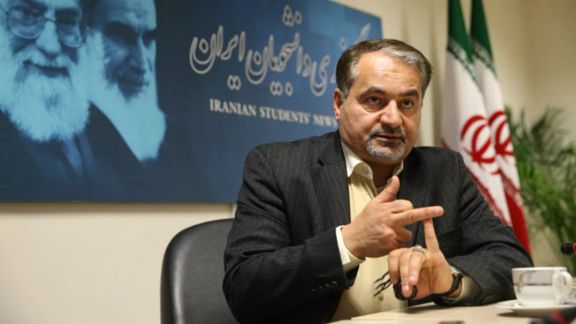German Think Tank Under Fire for Hosting Former Iranian Official

A Berlin-based think tank slammed for hosting a former Iranian ambassador accused of terror ties, has deleted the public announcement of the event after backlash.

A Berlin-based think tank slammed for hosting a former Iranian ambassador accused of terror ties, has deleted the public announcement of the event after backlash.
The Körber Foundation, founded by a former Nazi, had hosted Princeton academic Hossein Mousavian at a May breakfast event, but after a tide of criticism, the think tank deleted its X post.
Mousavian, who served as Tehran's ambassador to Germany from 1990 to 1997, is accused by activists of having reportedly played a crucial role in the assassinations of at least 24 Iranian dissidents in Europe during the 1990s.
One of the notable incidents was an attack on Berlin restaurant in the 1990s. Four Iranians were assassinated at the Mykonos restaurant by two masked gunmen in a plot sanctioned by the clerical regime’s then-president Rafasanjani, according to a Berlin court.
Lawdan Bazargan who oversees the organization, Alliance Against Islamic Regime of Iran Apologists (AAIRIA), wrote on X, “Deleting your tweet, @KoerberIP does not solve the issue. The fact still remains that you invited Seyed Hossein Mousavian, former ambassador of a brutal gender-apartheid Islamic Regime, who has the blood of many Iranians on his hands, and bragged about it.
Bazargan is leading a campaign to secure Mousavian’s dismissal from his academic job at Princeton University and after having taken a screenshot of the now-deleted Körber Foundation X post, exposed the think tank for hosting the controversial figure linked to the highest echelons of Iran's government.
Körber embedded four photographs of people at the breakfast, including pictures from Mousavian.
Shortly before Körber scrubbed its X post of the Mousavian event, Bazargan wrote “Shame on you @KoerberIP for meeting with Mousavian who at least has the blood of 24 Iranians on his hand. Fire Mousavian.”
The British-American actress and opponent of the clerical government in Tehran, Nazanin Boniadi, posted on X for her over 591,000 followers about the Körber event: “Mousavian was the Islamic Republic’s ambassador to Germany from 1990-97, during which time beloved Iranian dissident Fereydoun Farrokhzad was murdered in Bonn, and Kurdish-Iranian opposition leaders were assassinated in Berlin. Stop platforming him.”
When asked why Körber deleted the X post and for a copy of Mousavian’s talk, Julian Claaßen, a spokesman for Körber, told Iran International, “Dr. Hossein Mousavian was invited to background discussions at Körber-Stiftung in Berlin and Hamburg. Since its inception, Körber-Stiftung has been committed to dialogue, in line with the motto of our founder Kurt A. Körber ‘Talking to each other, not about each other’. Our aim is to explore the scope for political action and to contribute to international understanding, especially in times of acute crisis and conflict.”
Claaßen said discussions take place within Chatham House Rules, meaning the content and statements of individual participants are not disclosed. However, he added, “The discussions last Thursday and Friday centred on Iran's role in regional politics and domestic political developments in the Islamic Republic," claiming that he was also interviewed by staff for the in-house magazine, ‘The Berlin Pulse Express Edition’, which will be published next week.
When pressed about Mousavian’s alleged role in assassinations, his endorsement of the fatwa to murder the British writer Salman Rushdie and his support of the German-designated terror organizations, Hamas and Hezbollah, Claaßen said “we do not comment on political statements made by our guests.” The Körber spokesman also refused to comment on Mousavian’s alleged antisemitism, Mousavian having compared Israel with Nazi Germany on X.
According to the German government’s definition of antisemitism---based on the International Holocaust Remembrance Alliance concept of modern Jew-hatred—Mousavian expressed an antisemitic comparison.
Bazargan told Iran International that “Körber must apologize and change its policy toward the Iranian regime, and start supporting the Woman-Life-Freedom movement led by the youth in Iran. Several Iranians who were shot with pellet bullets and lost their eyes or hands in the recent uprising in Iran are now living in Germany. Körber should invite them and amplify their stories to highlight the true impact of the regime's brutality.”
The think tank was founded by Kurt A. Körber, a member of the Nazi party who worked for Universelle-Werke J. C. Müller & Co. which advanced Hitler’s war goals.
According to the Köber Foundation website, “Up to 3,000 foreign and forced laborers were used for this purpose…He is actively involved in the company’s armaments production.”
Iran International reported in March that Dr. Narges Eskandari, the mayor of Frankfurt in Germany, and a former Iranian political prisoner, said “Seyed Hossein Mousavian, Iran's ambassador at the time, is considered one of the key masterminds behind the attack. He had prior knowledge of the assassination attempt, and evidence implicates the Iranian embassy in the attack. To date, there have been no consequences for Seyed Hossein Mousavian. “
Mousavian is a Middle East Security and Nuclear Policy Specialist in the Program on Science and Global Security at Princeton University where he has been employed since 2009.
In April, over 70 Iranian-Americans, including the Germany-based Parviz Dastmalchi, a survivor of the 1992 Mykonos terrorist attack in Berlin, demonstrated at Princeton against Mousavian. The pro-Iran regime academic lashed out at the dissidents on X for calling on Princeton to fire him.
Körber has hosted Mousavian frequently over the years, including in 2018 and 2017.
Mousavian declined to respond to numerous Iran International requests for comment.